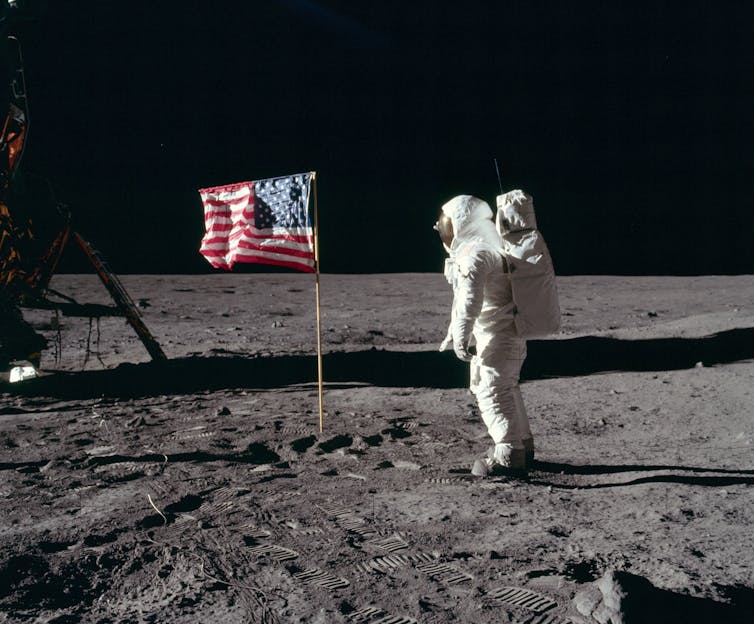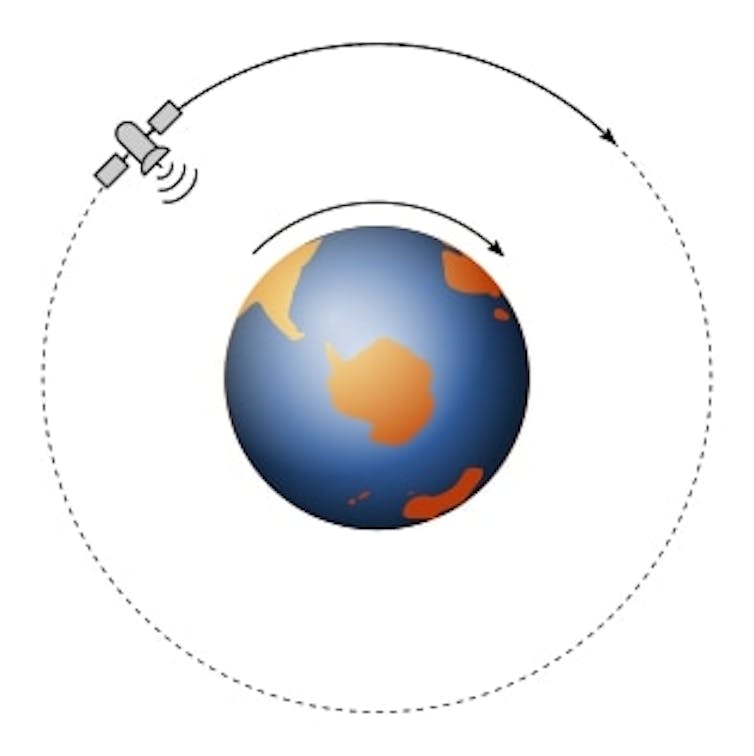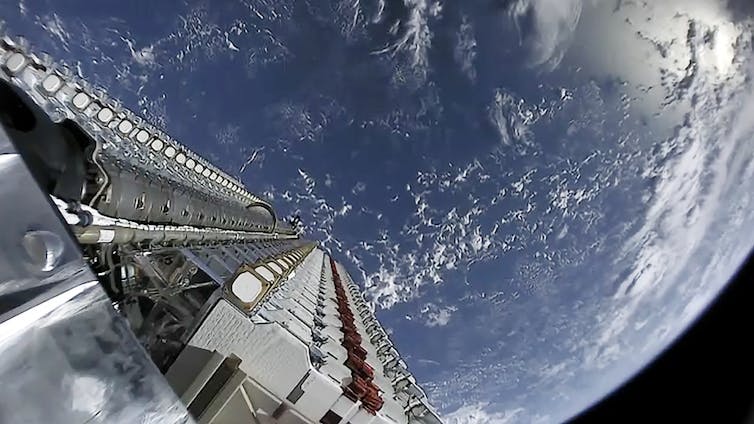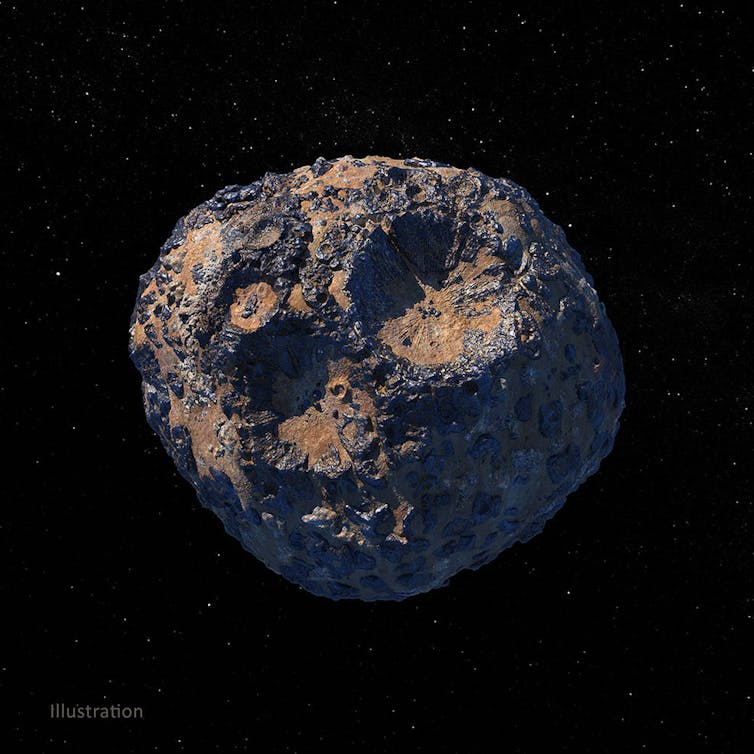The future of space could be a gold rush for resources – and not everyone will benefit, writes Theodora Ogden.

There is a U.S. flag on the Moon, but in the future, countries may start to turn access to the Moon and asteroids into serious wealth. (NASA/Neil A. Armstrong)
By Theodora Ogden
Arizona State University
 Satellites help run the internet and television and are central to the Global Positioning System. They enable modern weather forecasting, help scientists track environmental degradation and play a huge role in modern military technology.
Satellites help run the internet and television and are central to the Global Positioning System. They enable modern weather forecasting, help scientists track environmental degradation and play a huge role in modern military technology.
Nations that don’t have their own satellites providing these services rely on other countries. For those that want to develop their own satellite infrastructure, options are running out as space fills up.
I am a research fellow at Arizona State University, studying the wider benefits of space and ways to make it more accessible to developing countries.
Inequity is already playing out in access to satellites. In the not-so-distant future, the ability to extract resources from the Moon and asteroids could become a major point of difference between the space haves and have-nots. As policies emerge, there is the risk that these inequities become permanent.

Geostationary orbits, where a satellite stays above a single point along the Earth’s equator, are very valuable. But there is only enough room for 1,800 satellites in this orbit, and many of these slots are already taken or spoken for. (MikeRun/Wikimedia Commons, CC BY-SA)
Where to Park a Satellite
Thanks to the rapid commercialization, miniaturization and plummeting costs of satellite technology in recent years, more countries are able to reap the benefits of space.
CubeSats are small, cheap, customizable satellites that are simple enough to be built by high school students. Companies such as SpaceX can launch one of these satellites into orbit for relatively little – from $1,300 per pound. However, there are only so many places to “park” a satellite in orbit around Earth, and these are quickly filling up.
The best parking is in geostationary orbit, around 22,250 miles (35,800 kilometers) above the equator. A satellite in geostationary orbit rotates at the same rate as Earth, remaining directly above a single location on Earth’s surface – which can be very useful for telecommunications, broadcasting and weather satellites.
There are only 1,800 geostationary orbital slots, and as of February 2022, 541 of them were occupied by active satellites. Countries and private companies have already claimed most of the unoccupied slots that offer access to major markets, and the satellites to fill them are currently being assembled or awaiting launch.
If, for example, a new spacefaring nation wants to put a weather satellite over a specific spot in the Atlantic Ocean that is already claimed, they would either have to choose a less optimal location for the satellite or buy services from the country occupying the spot they wanted.
Orbital slots are allocated by an agency of the United Nations called the International Telecommunication Union. Slots are free, but they go to countries on a first-come, first-served basis. When a satellite reaches the end of its 15- to 20-year lifespan, a country can simply replace it and renew its hold on the slot. This effectively allows countries to keep these positions indefinitely. Countries that already have the technology to utilize geostationary orbit have a major advantage over those that do not.
While geostationary orbital slots are the most useful and limited, there are many other orbits around Earth. These, too, are filling up – adding to the growing problem of space debris.

Companies like SpaceX and Blue Origin are planning to put thousands of satellites in orbit – as seen in the photo of 60 SpaceX Starlink satellites about to detach from a rocket. (SpaceX/Flickr)
Low Earth orbit is around 1,000 miles (1,600 km) above the surface. Satellites in low Earth orbit are moving fast in a highly congested environment. While this may be a good place for Earth imaging satellites, it is not ideal for single communication satellites – like those used to broadcast television, radio and the internet.
Low Earth orbit can be used for communications if multiple satellites work together to form a constellation. Companies like SpaceX and Blue Origin are working on projects to put thousands of satellites into low Earth orbit over the next few years to provide internet across the globe. The first generation of SpaceX’s Starlink consists of 1,926 satellites, and the second generation will add another 30,000 to orbit.
At the current rate, the major space players are rapidly occupying geostationary and low Earth orbits, potentially monopolizing access to important satellite capabilities and adding to space junk.

Asteroids contain mind-boggling amounts of valuable metals – like 16 Psyche, seen here, which holds massive reserves of $10 quintillion worth of iron. (NASA/JPL-Caltech)
Access to Resources in Space
Orbital slots are an area where inequity exists today. The future of space could be a gold rush for resources – and not everyone will benefit.
Asteroids hold astounding amounts of valuable minerals and metals. Later this year, NASA is launching a probe to explore an asteroid named 16 Psyche, which scientists estimate contains over $10 quintillion worth of iron.
Tapping huge resource deposits like this and transporting them to Earth could provide massive boosts to the economies of spacefaring nations while disrupting the economies of countries that currently depend on exporting minerals and metals.
Another highly valuable resource in space is helium-3, a rare version of helium that scientists think could be used in nuclear fusion reactions without producing radioactive waste.
While there are considerable technological obstacles to overcome before helium-3 is a feasible energy source, if it works, there are enough deposits on the Moon and elsewhere in the solar system to satisfy Earth’s energy requirements for several centuries. If powerful spacefaring countries develop the technology to use and mine helium-3 – and choose not to share the benefits with other nations – it could result in lasting inequities.
Existing international space laws are not well suited to handle the complicated web of private companies and nations competing for resources in space.
Countries are organizing into groups – or “space blocs” – that are uniting on goals and rules for future space missions. Two notable space blocs are planning missions to set up bases and potential mining operations on the Moon: the Artemis Accords, led by the U.S., as well as joint Chinese and Russian plans.
Right now, the major players in space are establishing the norms for exploiting resources. There is a risk that instead of focusing on what is best for everyone on Earth, competition will drive these decisions, damaging the space environment and causing conflict. History shows that it is hard to challenge international norms once they are established.
Moving Forward
Access to space is critical for the functioning of a modern nation. Space access will only become more important as humanity rapidly advances toward a future of space hotels and colonies on Mars.
The 1967 Outer Space Treaty, the founding document of space law, says that space should be used “for the benefit and in the interests of all countries.” The policies taking shape today will dictate whether this is the case in the future.![]()
Theodora Ogden is a research fellow in emerging space countries at Arizona State University.
This article is republished from The Conversation under a Creative Commons license. Read the original article.
The views expressed are solely those of the author and may or may not reflect those of Consortium News.
Donate to Consortium News‘
2022 Spring Fund Drive
Donate securely by credit card or check by clicking the red button:

What is the point of all this “advancement” when we are destroying the world with greed. Same will happen with space exploration except it will destroy us faster. Rather have no nuclear weapons and roll back on other bombs and F planes while working on restoring humanity, morality and civility. Not going to happen but I sure can hope.
Re: geostationary orbits: at the altitude you mentioned the orbit circumference is larger than 250000 km. Divided by 1800 slots, that gives a margin of 134 Km between equidistant slots. What then is the source of this limit ? Surely it can’t be only interference, as your source mentions ?
Ms. Ogden–
I’ve been reading articles about harvesting the riches in outer space all my life. Nothing in that direction has happened yet. We do instead have satellites performing a most useful role in telecommunications, to everyone on Earth’s benefit. There are also somewhat to rather less useful satellites doing their tasks as well–military recon satellites do a most useful bit of work for the big powers’ militaries, but whether or not that serves any decent worthwhile benefit is rather arguable.
What I have never ever read in all these decades of space articles is any cost/econometric analysis of how much it costs to put a pound in orbit. I don’t know Elon Musk’s accounting, but my understanding of things is that around 600 lbs of rocket fuel needs to be burned to get a pound into geostationary orbit. That figure is rather old but it can’t be that far wrong, because THERE ARE NOT GOING TO EVER BE ANY MAJOR TECHNOLOGICAL BREAKTHROUGHS IN ROCKETS AND ROCKET MOTORS AND ROCKET FUELS EVER!!!!!! Maybe the space elevator might get built one of these days, but I’m thinking that that will require a major material science breakthrough to make its cables, like synthetic spider silk. Dunno, I’m no engineer, but I know enough to ask the right questions, which nobody in the space enthusiast community can ever manage to do. Oh, and by the way, there hasn’t been scientific research for jack-shit on our depositing rocket fuel combustion products into the upper atmosphere, but what little has been done doesn’t look at all good for the atmosphere, particularly with the order of magnitude or several increase in rocket trips that any sort of commercial extraction operation will require.
The part of your article on satellite allocation and crowding was good. But I’m telling you and everyone else in the space enthusiast community to just shut the fuck up about space resource extraction until you do some cost analysis of moving the products from there to here. That’s the question that needs answering, or, more realistically, at least a good investigation and discussion.
Sincerely,
Daniel N. White
“There is a risk that instead of focusing on what is best for everyone on Earth, competition will drive these decisions, damaging the space environment and causing conflict.”
I’d say that it is 100% certain that this is exactly what will happen. Mankind will fight over space exploration, colonisation and resource exploitation just like it has done on Earth. We are not a benevolent species, we rarely do anything for others without demanding something in return. History shows us this quite clearly.
It’s interesting to conjecture about space exploitation, but the reality is likely to be the opposite. It’s not that space exploitation is impossible, but problems here on earth make it highly unlikely. Long before the extraction and transportation of raw materials from the moon or Mars becomes profitable, the earth will be overwhelmed with sea level rise, desertification and pollution that will dislocate literally billions of people and cause food and water shortages, refugee crises, land conflicts, national bankruptcies, and more wars.
The concept of colonizing the moon or Mars is absurd at this time as no colony on either body is viable without substantial material and logistic support from earth and with an earth in ruins, those colonies would soon perish.
All of the dreams of the space advocates are within the realm of possibility, but until humans get their act together and stop polluting, warring and bickering, space exploitation doesn’t stand a snowball’s chance in hell. What’s worse is that all attempts to commercially extract mineral resources and/or colonize the moon or Mars only make matters worse by diverting resources away from solving the immediate crisis at hand.
You sum things up well!